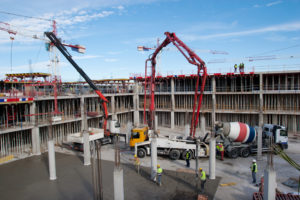
Last week, I read an Associated Press article commenting on the economy’s effects on the home building market: As fewer people buy homes, apartment construction surges. While this makes sense, the statistics in this article impressed me. In the past twelve months, building permit applications for apartments rose by a staggering 63%.
This means there are a lot of folks out there working on apartment projects. And since there are special considerations for those liening an apartment complex project, I figured that now is a perfect time to post about them.
There are really two big picture issues to consider, which I’ll discuss in turn.
Apartment Complex Projects Are Usually Not Residential Projects
First, if you were hired by the property owner, then you’re doing work for the complex itself. You can certainly file a mechanics lien against the apartment complex, but you should first determine whether the complex is considered a residential or a commercial project under your state’s lien laws.
The classification of the construction project can make a big difference to your mechanics lien claim. Certain states have different mechanics lien timelines or notice requirements depending on whether the property is residential or commercial in character.
One very common mistake mechanic lien claimants make when working on a apartment complex is to classify it as a residential project. In fact, in most states apartment complexes are not residential projects.
This seems a little counter-intuitive at first. After all, aren’t folks going to be living in the apartments?
While an apartment complex serves a residential purposes, most states’ mechanic lien laws only consider a project residential if it is a single-family residence or a residence for 4 or less families (each state is different in this standard). The reasoning for this is that legislatures usually create special notice and mechanic lien requirements for residential construction because that type of construction involves unsophisticated homeowners and is most vulnerable to abuse. While apartment complexes will eventually serve a residential function, they are typically developed by more sophisticated property owners, and therefore, do not present the same dangers.
Learn more: How Much Does it Cost to Build an Apartment Complex?
Improvements For Tenant Present Sticky Situation
The second big picture issue to consider arises if you’re doing some type of construction work for an apartment’s tenant, as opposed to the complex itself. In residential apartment complexes this is not typical, since most improvements and repairs are the landlord’s responsibility. However, there are some occasions when the tenant commissions work (i.e. painting, elective improvements, etc.).
In these instances, the type of construction likely swings back to being residential in character, but more importantly, your right to file a mechanics lien becomes much more submissive to the state’s mechanic lien laws.
In many states, you’re allowed to file a mechanics lien against an improvement for work commissioned by a tenant, but only against the tenant’s interest in the property (a “lease interest”). In other states, you’re allowed to file a mechanics lien against the property itself just as if the property owner had commissioned the work. And a third class of states don’t allow the lien at all if a tenant commissioned the work.
If you’re doing work for a tenant, it’s important to figure out which type of state you’re in, and to file your mechanics lien accordingly.


